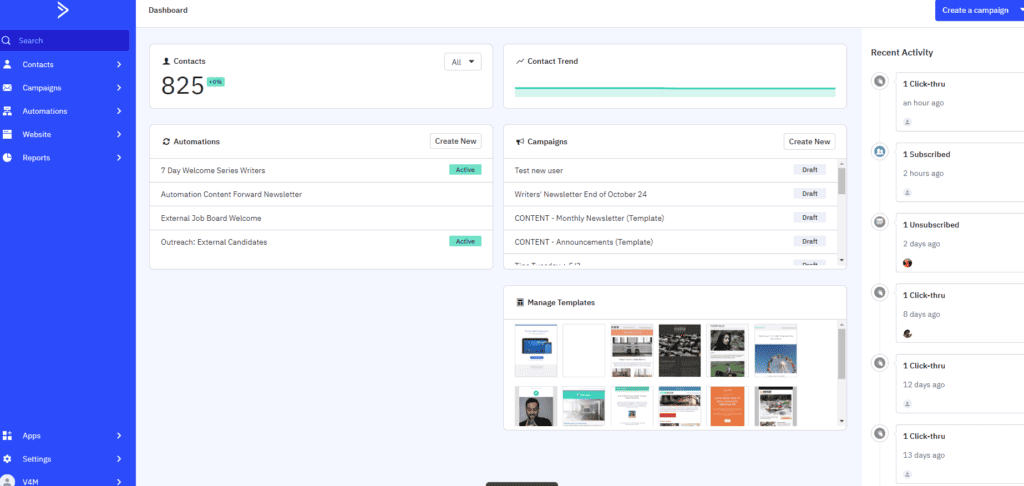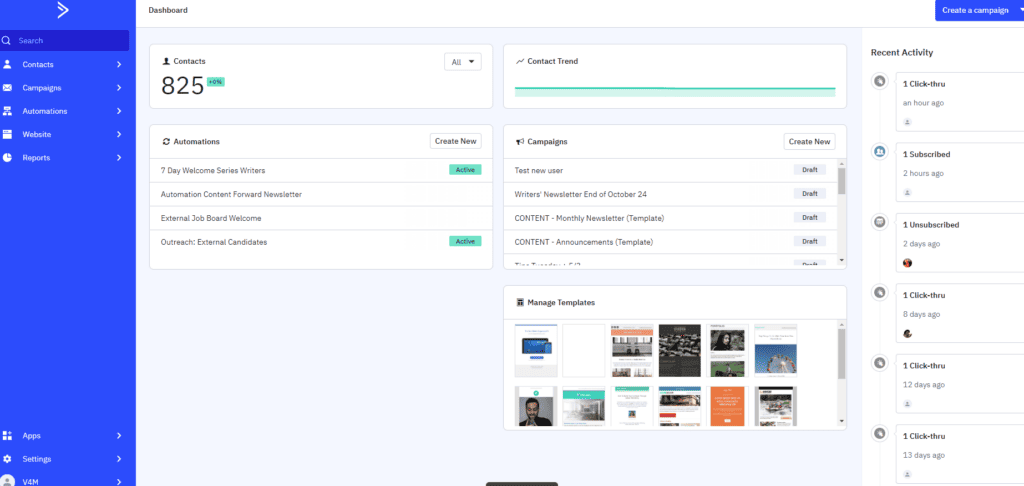- What are the Main Differences Between Clickfunnels and ActiveCampaign?
- So What IS ActiveCampaign
- And What is Clickfunnels
- Clickfunnels vs ActiveCampaign Pricing Comparison
- Clickfunnels and ActiveCampaign Integrations Compared
- What I Like About ActiveCampaign
- What I Like About Clickfunnels
- Who Should Use ActiveCampaign
- Who Should Use Clickfunnels
- Other Similar Alternatives
- My Final Cut: Which do I Use?
Last Updated on April 12, 2024 by Ewen Finser
If you are trying to figure out if you should go with ActiveCampaign or Clickfunnels for your marketing funnel, this comparison is for you.
I’ve been operating digital businesses for the last 10 years and have used BOTH platforms at various points. I still remember the day Clickfunnels blew up and literally everyone and their dog was creating one-minute funnels to sell god knows what.
ActiveCampaign was also my first true marketing automation platform that I tried, back when most email list platforms were glorified newsletter services.
That said, the hype HAS settled down a bit for BOTH of these brands. They are still kicking and serve some distinct use cases, but I do think they are different enough to be better suited for specific marketing objectives…
Here’s how I’d summarize the overall trade offs between Clickfunnels and AC:
What are the Main Differences Between Clickfunnels and ActiveCampaign?
While they share some core features, there’s actually a fair bit that separates these two platforms:
- ActiveCampaign is primarily geared towards email marketing communications and automations, whereas Clickfunnels is a landing page builder with some email marketing functionality.
- ActiveCampaign has much more pricing flexibility and customization based on your business use cases, whereas has 3 core pricing tiers.
- ActiveCampaign is often cheaper, with plans starting under $20/month, whereas Clickfunnels suite STARTS at $147/month for the entry level “Basic” tier.
- Clickfunnels is a completely “self sufficient” website and funnel builder, whereas ActiveCampaign requires a third-party integration platform and does not offer self-hosted websites.
- ActiveCampaign offers advanced automations an CRM-lite features, whereas Clickfunnels email suite is more short-term transactional in nature (supporting the funnels).
- Clickfunnels makes it easier “build a business in a day” whereas ActiveCampaign will take a bit longer to fully integrate and set up across multiple software integrations.
Now that I’ve covered the key differences, let’s narrow in on what these two platforms really are…
So What IS ActiveCampaign
I first started using ActiveCampaign back in 2014 when email marketing automation was JUST getting started. Before ActiveCampaign, my experiencew with Aweber, Mailchimp, Constant Contact and the like was essentially that of a basic newsletter builder.
ActiveCampaign was one of the first to fully embrace automations and still is one of the most in-depth conditional communications builders I use.

While they have had some feature creep over the years, ActiveCampaign (at it’s core) is still an email-centric marketing automation suite. You can build funnels (just like Clickfunnels), but it’s not a stand alone “all in one” platform.
In a nutshell, ActiveCampaign’s focus is on marketing automation, email marketing, and sales engagement (CRM).
This is helpful content to better understand how Clickfunnels is positioned against AC…
And What is Clickfunnels
Clickfunnels burst onto the seen back when I was getting started in 2014 as a super simplified all-in-one selling machine.

That’s still their core positioning today.
Rather than mess around with dozens of integrations, mastering Shopify, WordPress, email marketing, etc… Clickfunnels promises a simple drag and drop (point and click) interface building to customize your end-to-end business funnel.
This simple premise is what makes Clickfunnels an incredibly relevant option today in a world of “busy” plugins, software, and platforms.
Clickfunnels vs ActiveCampaign Pricing Comparison
The pricing structures are actually fairly different between ActiveCampaign and Clickfunnels, mostly due to their different feature positioning.
That said, ActiveCampaign is a bit more complex. There’s a pricing plan for everyone, but it can take a bit to figure out exactly where you sit:

As you can see above, it’s a fairly involved process just to determine WHAT plan you need, let alone which is better.
Most users will likely fall into the “Marketing” bucket here, but for high ticket sales organizations the “Sales” plans make the most sense:

Or, for industries where sales can happen in both automated and higher touch roles, the “Bundles” plans make sense:

And lastly, ecom stores are best served by the “Transactional Email” tier:

Interestingly, once we move to purely transactional plan, the pricing scheme moves from a flat rate, subscriber based one to an “emails per month” send-volume pricing.
Clickfunnels goes the other direction with their pricing, aiming to put everyone in 3 fairly cut and dry buckets:

Clickfunnels is a much more significant up front commitment, starting at $147/month. Interestingly, they still use a “contact” based pricing methodology, which is similar to ActiveCampaign’s subscriber based pricing.
Keep in mind, the pricing is inclusive of many of the ancillary costs one might incur with a separately managed website (hosting, DNS, themes, plugins, etc…). Still, $147/month is a fairly steep price IMO.
Clickfunnels probably makes sense if you either have ONLY one main business and don’t want digital complexity OR if you are a Clickfunnels power user (or agency / consultant) and can justify the premium “Funnel Hacker” plan.
As a side note, although they list the “Funnel Hacker” plan as discounted from “normally” $497/month, I haven’t actually seen this list price (non-discounted) in years.
All in all, ActiveCampaign’s PRICING plan is a bit harder to figure out initially, but if you can invest some time in figuring out your specific use case, will probably be a better value and be a “snug fit” relative to Clickfunnels 3 broad buckets.
Clickfunnels and ActiveCampaign Integrations Compared
One of the ways I judge a good marketing platform is how well and how extensively it integrates with others.
As much as the “all in one” platforms sound good in theory, there’s usually some very good reasons to integrate widely. I’m not all about the “Microsoft” approach to walled gardens.
So how does Clickfunnels and ActiveCampaign measure up in this department?
They both offer fairly extensive integration options, but I have to give it to ActiveCampaign for leading the pack as one of the most integration friendly platforms I’ve used:

They have an expansive array of integrations in pretty much every category, including Clickfunnels if you want the best of both worlds.
ActiveCampaign has succeeded here partly because of how easy they make it for other brands to create native integrations on their own:

Clickfunnels also features a fairly extensive partner ecosystem, but not quite to the scale of ActiveCampaign:

That said, Clickfunnels also DOES a bit more than ActiveCampaign, meaning that you probably won’t need as many third-party integrations to begin with.
Personally, I’m a fan of integrations as we use a variety of software solutions (Shopify, WooCommerce, and WordPress, for example) and it doesn’t make sense for us to build our entire stack on Clickfunnels.
What I Like About ActiveCampaign
Rather than just list a re-hash of ActiveCampaign’s feature list (there are a lot), I wanted to “brief by exception” and highlight some of the areas where ActiveCampaign really separates from the pack:
- Adaptable to Any Business Model: ActiveCampaign is a fairly broad platform these days, with a use case for pretty much everyone. Particularly if you cross over marketing disciplines (e.g. content marketing + Shopify or sales + newsletter), AC is one of the best omnichannel email marketing stacks I’ve used.

- Flexible Pricing: Whereas Clickfunnels gives you just 3 core options, ActiveCampaign has dozens of different price points and feature-sets based on your specific needs. This means it can be much more bespoke and you’ll probably save money on the way up as you scale.
- Strong Automations: While the complexity might present a bit of an initial learning curve, ActiveCampaign has some of the deepest and most customizable automation builders on the market. If evergreen marketing is your jam, AC is top of the list in my mind.

- Integration Friendly: As discussed in the integrations section above, ActiveCampaign has some of the widest integrations of any marketing platform I’ve used. It’s one of the main reasons I’ve stuck with them over 8+ years.
- CRM Functions: IF you lean more on the CRM side of sales marketing, ActiveCampaign bridges the divide with advanced automation logic + robust data and behavior based triggers. Definitely worth a hard look if this sounds like you.
What I Like About Clickfunnels
Here are some of the aspect of Clickfunnels that still stand out for my as unique and valuable:
- Easy to Launch: If figuring out ALL of the integrations and tech stack considerations is actively PREVENTING you from launching your product, Clickfunnels sweeps all of those objections away with their all-in-one platform. As I’ve heard (and experienced) so many times, DONE is better than perfect & this is what Clickfunnels thrives on.

- Beginner Friendly: If the thought of figuring out ALL of the integrations and technical components is the biggest road block, Clickfunnels is made for you. It’s all about remove the barriers to launching great products by making the technical pieces comparatively easy.
- Great for Digital Products: If you are running lots of information marketing campaigns for digital products and courses, Clickfunnels has some great use cases for this avatar.
Who Should Use ActiveCampaign
ActiveCampaign is a more widely applicable marketing suite for a broader array of businesses.
- Already have an established business? It’s going to be a lot easy to INTEGRATE your existing business with the exact tools and funnels you need vs porting over to Clickfunnels. In this case, I’d definitely go with ActiveCampaign.
- Need advanced data & analytics? ActiveCampaign collects data on pretty much everything and then presents it in a variety of useful ways. If this is key to your businesses, go with ActiveCampaign.
- Evergreen automation nerd? If you love designed finely tuned evergreen automation that work while you sleep, ActiveCampaign is the clear choice for email based communications.
And – to be 100% transparent – I’m still using ActiveCampaign for many of our businesses to this day! If you are struggling to make a decision, this is where I’ve “voted with my wallet”.

Who Should Use Clickfunnels
I still love the idea of Clickfunnels and would recommend it to someone who has digital familiarity, but doesn’t have an established platform yet on WordPress, Shopify, etc…
If you have a burning idea and need a quick and clean sales funnel, it’s really hard to beat the value and simplicity!
Other than that, if you have a single product or related product family (think: Athletic Greens back in the day), Clickfunnels also makes some sense as the simple upsells and funnel design is especially powerful if you have your offers dialed in.
Other Similar Alternatives
You may be deciding between ActiveCampaign and Clickfunnels specifically, but I always like to examine the field a bit more broadly, just to ensure I’m not missing something.
These are some alternative options I’ve tried over the years (or actively use) that may actually solve your specific use case a bit better.
- Unbounce: If you are looking for a more narrowly focused funnel builder that doesn’t really try to do email, but integrates with everything, I’d give Unbounce a look. See how Unbounce compares directly to Clickfunnels for more info.
- Omnisend: For eCommerce sellers looking for a more narrowly focused ecommerce specific platform (works great with Shopify, WooCommerce), check out Omnisend. See how Omnisend compares directly to ActiveCampaign here.
- ConvertKit: For “story telling” businesses around personal brands and digital products (or the new “newsletter” trend), ConvertKit has some compelling features. See how ConvertKit compares to ActiveCampaign here.
- MailerLite: For a more “no frills” email automation software if you are just getting started OR looking to save money, MailerLite is an approachable email alternative with affordable pricing for all budgets. See how MailerLite compares to AC here.
My Final Cut: Which do I Use?
I’ve used BOTH platforms over the years at varies times. I can definitely see the reasons when and why someone might go with one over the other. They are both useful in their own right!
BUT, the proof is in the pudding for me. To this day, I still have a paid ActiveCampaign and use it everyday for some of our brands. I’ve been a customer since 2015!
I think the truth for me is that there are plenty of more affordable ways to build sales funnels on the flexible platforms I prefer (WordPress, Webflow, etc..), so why lock myself in?
Clickfunnels does DO a lot in terms of features, but I’ve found it’s somewhat uneven across the feature-set. For example, their built-in email automations are nice for specific types of selling, but fairly limited for a broad set of businesses.
And while Clickfunnels DOES technically offer email delivering capability, it’s nowhere near the complexity and customizability of ActiveCampaign for intermediate to advanced marketers.
Bottom Line Summary: Unless you are truly starting from scratch, ActiveCampaign is my pick for the more versatile solution for MOST use cases I’ve come across.
That said, if you are just getting started and need a quick funnel, Clickfunnels is incredibly attractive with a simple builder flow and all-in-one integration. I AM in favor of taking action and don’t get overly precious about specific platforms if they are solid. And Clickfunnels is still solid!
Take the best email automation and mix it with all the best parts of a CRM. Result: ActiveCampaign. While I call it a "lite CRM", AC is no lightweight. I've been with them for years and LOVE the endless integrations and expandability.

